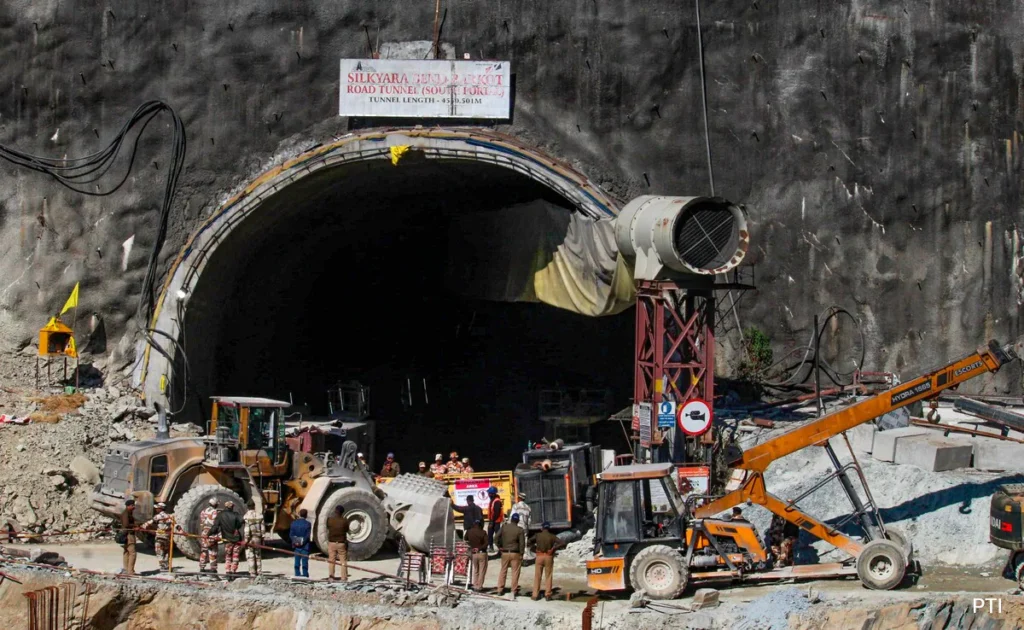So close yet so far: Obstructions put off Uttarkashi tunnel rescue by some hours
Amidst the perilous labyrinth of the Uttarakhand tunnel disaster, the rescuers contemplate the stratagem of orchestrating an exodus for the beleaguered forty-one laborers.
A meticulous plan unfolds where each trapped soul shall be extricated, not by foot, but borne upon wheeled stretchers traversing the conduit meticulously hewn for their salvation.
This avant-garde methodology, as elucidated by the Director General of the National Disaster Response Force (NDRF), Atul Karwal, aims to circumvent the challenges posed by the workers’ deteriorating health, exacerbated by a dozen days ensconced beneath the cavernous remnants of the tunnel.
The proposition of orchestrating a sequential crawl-out for the workers had not escaped the contemplative minds of the rescue brigade. Alas, the prolonged sojourn amid the tunnel’s detritus had sapped the vigor of the laborers, rendering the prospect of independent traversal an arduous feat.
Twelve days of subterranean habitation, devoid of natural luminance and substantive sustenance, cast a pall over their vitality, even as vital provisions trickled through diminutive “lifeline” conduits.
The NDRF operatives shall ingress the tunnel via the perforated passageway, employing the stretchers as a conveyance for the emancipated workers. Each laborer, ensconced upon the stretcher, shall assume a supine posture to preclude limb abrasion against the metallic underbelly of the welded pipe.
NDRF personnel, akin to marionettists, shall orchestrate this intricate ballet by manipulating ropes tethered to the stretchers, ensuring a gradual and unscathed exodus.
The resumption of the rescue endeavors unfolded in the wake of the removal of an obstructive iron mesh impeding the auger machine’s pursuit of an escape conduit. The 800-mm diameter rescue pipe, an instrumental lifeline, is slated for meticulous cleansing to obviate any impediments that might impinge upon the stretcher’s trajectory.
Mr. Karwal asserts that the pipe’s generous dimensions facilitate the seamless egress of the entrapped workers, offering a glimmer of emancipation from their subterranean confinement.
As the auger machine punctuates the debris-laden abyss, successive pipes traverse the mire, coalescing through welding. This intricate choreography is the prelude to the imminent liberation, with welders dispatched from Delhi tasked to conclude the final juncture of the lifeline. The unveiling denouement commences with the completion of drilling, paving the way for the welders to wield their craft.
“The next pipe is currently undergoing the welding process. Our intention is to bore two additional pipes, thus achieving a cumulative length of up to 60 meters through the rubble, thereby affording an expanded sanctuary,” elucidates Mr. Karwal.
The NDRF chief divulges that Uttarakhand’s Chief Minister, Pushkar Singh Dhami, engaged in a heartening discourse with the ensnared workers, discerning a resilient spirit amidst their predicament. “Those accustomed to the subterranean travail exhibit remarkable fortitude, cognizant of the Herculean endeavors undertaken for their deliverance. Optimism pervades their outlook,” affirms Mr. Karwal.
The epicenter of the rescue endeavors converges upon a 2-kilometer stretch of the tunnel, where concrete fortifications have culminated. This bastion not only ensures structural integrity but bestows the luxury of electricity, potable water, and a novel six-inch-diameter conduit to dispense culinary provisions and pharmaceutical succor.
The focus of the second lifeline is a culinary lifeline, disseminating sustenance in the form of roti, subzi, khichdi, daliya, along with citrus fruits and bananas. Concurrently, a cache of essentials, including apparel, toothpaste, and soap, is relayed to alleviate the tribulations of the stranded laborers.

